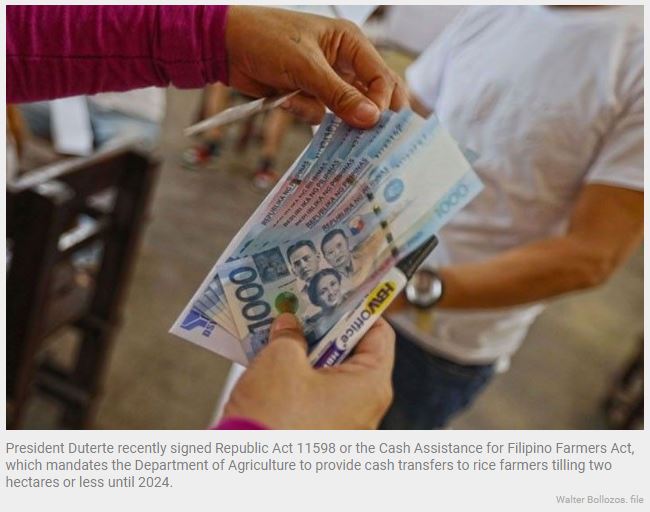Philippines: Cash assistance law will not offset huge import losses
MANILA, Philippines — The law that provides direct cash assistance to rice farmers is not seen to offset the huge losses of farmers due to excessive rice imports, according to the Federation of Free Farmers (FFF).
President Duterte recently signed Republic Act 11598 or the Cash Assistance for Filipino Farmers Act, which mandates the Department of Agriculture (DA) to provide cash transfers to rice farmers tilling two hectares or less until 2024.
Funds will be sourced from imported rice tariff collections in excess of P10 billion of the Rice Competitiveness Enhancement Fund (RCEF) under the Rice Tariffication Law (RTL).
The FFF cited its own studies using official data from the Philippine Statistics Authority (PSA),which showed that rice farmers lost an average of P6,000 per hectare harvested in 2019 and 2020 due to the drop in farmgate prices, following the enactment of the RTL in March 2019.
“Assuming a farmer has two hectares and harvested two times in a year, his losses in 2019 and 2020 would total P24,000,” FFF national manager Raul Montemayor said.
“Last year, the DA started giving cash assistance of only P5,000 per farmer, using some P7 billion in excess tariff collections in 2019 and 2020. This is equivalent to only 20 percent of the farmers’ losses during the two-year period,”Montemayor said, referring to the DA’s RCEF-Rice Farmers Financial Assistance (RCEF-RFFA) program.
He said the cash transfer program is discriminatory since it excludes farmers tilling more than two hectares who are not necessarily better off since they have also been affected by the drop in palay (unhusked rice) prices.
The FFF estimates that future cash transfers to each of the 1.5 million eligible rice farmers would probably amount to only P3,000 annually, assuming excess tariff collections average P5 billion a year.
Data from the DA showed that excess tariffs from rice imports collected in 2019 amounted to P2.14 billion and P5.47 billion in 2020.
According to the FFF, this subsidy will be negated by higher farm production costs resulting from the recent spike in fertilizer prices, even as palay prices have continued to decline due to the unimpeded arrival of rice imports, particularly during peak harvest periods.
The group pointed out that the RTL was originally intended to allocate some of the excess tariffs for other key programs, such as crop insurance and crop diversification.
“These programs can provide more significant, cost-effective and longer-lasting benefits to rice farmers who have to grapple with recurrent typhoons and price fluctuations,” Montemayor said.
“However, they will now lose their funding, because RA 11598 allocates all excess tariffs exclusively to cash transfers,”he said.
The FFF reiterated its call for the DA to avail of trade remedies, such as safeguard duties, in order to prevent supply gluts due to excessive imports, which are the primary cause of the fall in palay prices.
It said safeguard duties could temporarily increase rice tariffs if imports are found to be excessive and seriously hurting local farmers.
“The DA has refused to use this remedy and has instead resorted to suspending the issuance of rice import clearances from time to time despite the absence of clear quarantine risks,”the FFF said.
The FFF has repeatedly warned that this is prohibited under the rules of the World Trade Organization and Philippine laws.
“It does not make sense for the DA to entice farmers with seed and fertilizer subsidies to increase their production while, at the same time, allowing excessive importation,” Montemayor pointed out.
“This is a recipe for disaster. It will only cause a supply glut and plunging palay prices, which the DA will now try to offset partially through cash transfers. Why not just manage the inflow of imports so that palay prices will not fall drastically and then use the excess tariffs for other critical programs, aside from cash transfers?,”he said.
Data from the DA showed that rice imports in the first three quarters of 2021 reached 2.1 million metric tons (MT).
For 2021, rice imports were projected to have hit as much as 2.95 million MT.
Source: https://www.philstar.com/business/2022/01/10/2152778/cash-assistance-law-will-not-offset-huge-import-losses


 English
English




